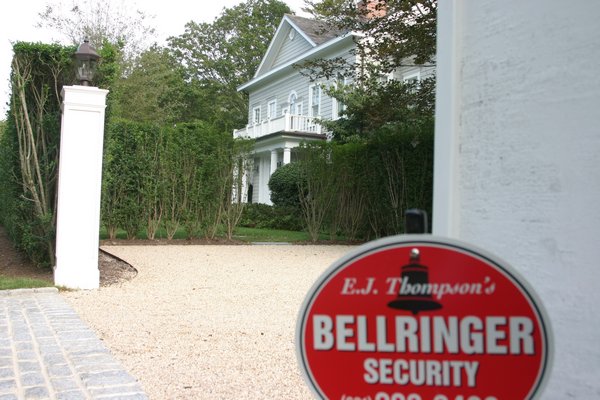
Three years ago, Southampton real estate agent Michael Nappa had problems with the alarm system at his Shinnecock Hills home. The system had some battery issues and went off accidentally several times. Police were sent to the house on multiple occasions, only to find a locked and quiet house.Mr. Nappa was told by his alarm company that he’d have to pay a charge billed by the town of $100 for each time the Southampton Town Police were sent to the house—compounding, so that the fifth time the alarm went off, the bill would be $500. The bills piled up, but Mr. Nappa was told that after the end of year the compounding would stop.
Fast-forward three years to this past summer: Mr. Nappa’s alarm system had been well-behaved. But then a workman coming to the house set off an alarm. The company was unable to reach Mr. Nappa and, again, the police came. A few weeks later came the big surprise—a $600 bill from the town for the police response to the false alarm.
Mr. Nappa says he was then informed that the town had changed its policy in 2011 so that the compounding charges for a police or fire department response to false alarms does not reset at the end of a calendar year.
“I thought it would be $50 or $100—I just don’t think someone should get punished this much because of a problem years ago,” Mr. Nappa said. “[Previously,] at the end of the year you started anew. To me, that was fair, because with these systems you get something that goes wrong, but you get stuff figured out and go a year without any alarms.”
Alarm companies say the shock felt by Mr. Nappa and other homeowners at the size of the bills they are receiving is increasingly common, and that fewer customers actually turn on their alarm systems because of the charges—a habit that could be counterproductive to police enforcement efforts.
“A lot of times it is customer error—they forget a code or send a workman without telling them the code, or real estate agents are a huge culprit,” said Michael Mulcahy of Berkoski Securities. “If you have four false alarms in a year, you deserve a big fine. But if you have three this year and then don’t have one for five years, and you get hit for a $500 fine? That’s not fair.”
Alarm companies and their customers were not notified of the change in the town’s policy, he added.
The fines are assessed only if the police are called by the response personnel at the alarm company. When an alarm goes off, the company tries to contact the homeowner first, and then a secondary contact. But if no one can be reached, they must call in emergency response, especially in the case of a fire alarm.
Companies are adjusting their procedures, putting off calls to police as long as possible if low batteries appear to be the culprit of the alarm, and keeping lists of up to three people that should be contacted before police are called.
Town Comptroller Len Marchese says the town does have a cap on how much the fines compound, limited to $1,000 for a single fine. But if it reaches that point, each time the alarm goes off a $1,000 invoice is sent out. He said the Town Police respond to 250 to 300 false alarms each month.
The false alarm fines are a big revenue source for the town, though the certainly a drain on resources too. Since the policy on compounding alarms was changed, however, the income from fines has doubled. In 2012, the town took in $407,800 from false alarm fees, up from an average of $200,000 prior to the change.
“It’s a lot of out-of-town people, and they don’t fix the alarm, so they go off over and over, and they don’t realize they’re getting billed. At the end of the year, it just goes on their tax bill, and they still don’t notice it,” Mr. Marchese said. “There is an appeals process to the Public Safety Commission, and they do get reversed from time to time.”
But Mr. Mulcahy said his customers have told him that the appeals process has become far less reliable for getting charges removed or reduced for false alarms. And the effect has been that fewer alarms are being set by homeowners.
Town Supervisor Anna Throne-Holst said the town has heard the complaints from homeowners and alarm companies and has contemplated the policy but is not inclined to change things. “These false alarms take a police officer time to respond to—that’s time that he is not on patrol, and it affects the general public safety,” she said recently. “There is a cap on the fines. We want to make sure there is balance there, so people are using their alarms but making sure they’re operating properly.”
Mr. Nappa said he doesn’t think the large charges now hanging over his head because of issues three years ago are making anything safer.
“You want people to have an alarm system and to turn it on—it’s good for the safety of the town,” he said. “But people aren’t going to set them if there’s a big fine because of something they can’t control. It’s only logical.”